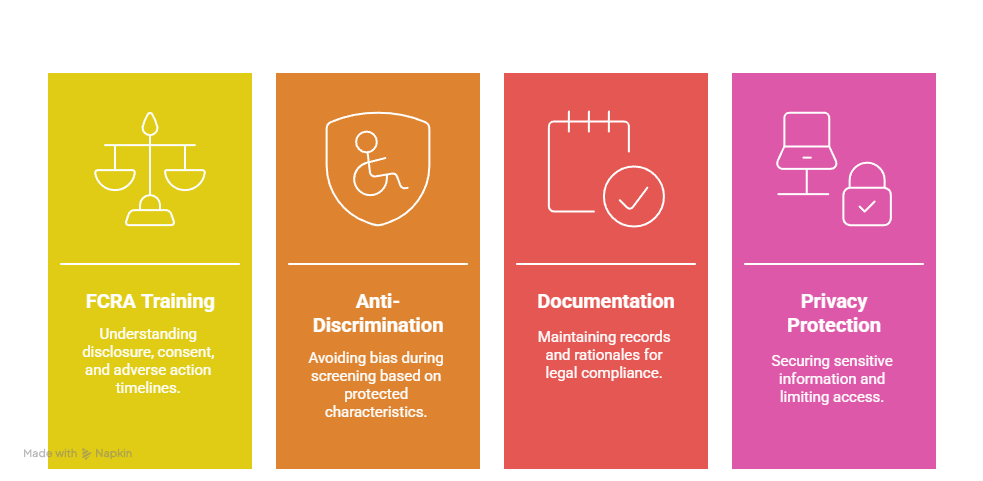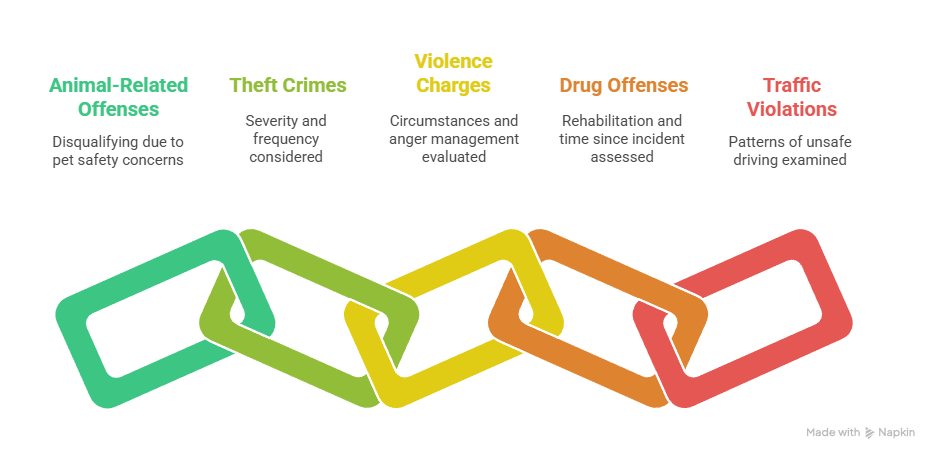Pet sitter background checks are essential screening tools that help small businesses verify potential employees' criminal histories, driving records, and professional credentials to ensure safe, reliable pet care services. Implementing FCRA-compliant background screening processes protects your business from liability while building trust with pet owners who entrust their beloved animals to your care.
Key Takeaways
- Pet sitter background checks reduce liability risks by identifying candidates with criminal histories involving animal abuse, theft, or violent crimes that could endanger pets or property.
- FCRA compliance requirements mandate that employers obtain written consent, provide proper disclosures, and follow adverse action procedures when using background checks for hiring decisions.
- Typical screening costs range from $15-75 per check, depending on the scope of searches including criminal records, driving history, and professional reference verification.
- State and local laws vary significantly regarding background check requirements for pet care businesses, with some jurisdictions requiring specific certifications or bonding for commercial pet sitters.
- Multi-layered screening approaches combining background checks with reference verification, skills assessments, and trial periods create the most comprehensive evaluation process.
- Regular re-screening policies help maintain ongoing safety standards, with many businesses conducting annual background updates for long-term employees.
Why Pet Sitter Background Checks Are Critical for Your Business
Pet sitting businesses face unique risks that make employee screening particularly critical. Unlike traditional service industries, pet sitters often work alone in clients' homes with minimal supervision. This creates potential exposure to theft, property damage, or animal mistreatment. Additionally, pet sitter background checks serve as the first line of defense against hiring individuals with histories of relevant criminal activity.
Insurance companies increasingly require documented screening procedures before providing coverage for pet care businesses. Many liability policies specifically exclude claims involving employees who weren't properly vetted through background check processes. Furthermore, pet owners expect professional pet sitting services to demonstrate the same level of care in hiring that they would want for their own family members.
The pet care industry has experienced significant growth over recent years. The American Pet Products Association reported over $136 billion in pet spending for 2024. This expansion attracts both qualified candidates and opportunistic individuals seeking access to homes and valuable pets. Moreover, implementing thorough background checks for pet sitters helps legitimate businesses maintain professional standards while protecting their reputation in competitive markets. Therefore, businesses that skip this critical step risk both their insurance coverage and their professional standing.
Legal Framework and FCRA Compliance Requirements
The Fair Credit Reporting Act governs how employers can obtain and use background check information for hiring decisions. FCRA compliant background check procedures require specific disclosures and consent forms before conducting any screening activities. Employers must provide clear, standalone documents explaining their intention to perform background checks, separate from employment applications or other hiring paperwork.
Pet sitting businesses must follow strict adverse action procedures when background check results influence hiring decisions. This includes providing pre-adverse action notices with copies of the background report. Additionally, employers must allow reasonable time for candidates to dispute inaccurate information. Finally, businesses must issue final adverse action letters if proceeding with rejection decisions. These compliance steps protect both the business and job candidates throughout the screening process.
State-Specific Background Check Laws for Pet Care Businesses
Different states maintain varying requirements for background checks in pet care industries. Some jurisdictions mandate criminal background screening for commercial pet sitting operations. However, others leave screening decisions to individual business discretion. California, for example, requires businesses with employees to follow specific timing and disclosure requirements that differ from federal FCRA standards.
Local licensing authorities may impose additional background check requirements for pet sitting businesses. Many municipalities require business license applicants to undergo criminal screening. Furthermore, they must maintain current background check records for all employees handling animals or accessing client properties.
Comprehensive Types of Background Checks for Pet Sitters
Pet sitting businesses should consider multiple screening components to create comprehensive safety profiles. Criminal history searches form the foundation of most screening programs. However, additional verification steps provide more complete candidate assessments. The specific combination of background check elements depends on business size, service types, and risk tolerance levels.

- County Criminal Records: Local court databases for felony and misdemeanor convictions in candidate's residence and employment history locations
- Multi-State Criminal Database: Broader criminal history information from participating jurisdictions across multiple states
- Federal Criminal Records: Federal convictions including interstate crimes, drug trafficking, and federal fraud charges
- Sex Offender Registry: Verification that candidates aren't registered sex offenders in current or previous residence locations
- Driving Record Check: Motor vehicle records for candidates who will transport pets or drive company vehicles
- Professional References: Previous employers, veterinary clinics, or pet care facilities for work history verification
- Social Security Verification: Confirms identity and reveals additional name variations or addresses for more thorough searches
- Education Verification: Validates claimed certifications or training credentials relevant to pet care services
These screening components work together to identify potential red flags while ensuring compliance with applicable employment laws. Most background check providers offer customizable packages allowing businesses to select relevant searches based on specific job requirements.
Basic vs. Enhanced Screening Packages
Basic packages typically include county-level criminal searches and sex offender registry checks. These entry-level screenings cost between $15-30 per candidate. Enhanced screening adds federal databases, driving records, and professional reference verification for $35-55 per check.
Comprehensive screening packages range from $50-75 and include multi-state databases, identity verification, and employment history checks. These thorough packages provide the most complete risk assessment for pet sitting positions involving overnight stays or high-value client properties.
Critical Red Flags in Pet Sitter Background Screening
Certain criminal convictions pose significant risks for pet sitting positions and warrant careful consideration during hiring decisions. Animal cruelty convictions represent the most serious red flags. These indicate potential danger to pets under the candidate's care. Theft-related convictions also raise concerns given pet sitters' access to client homes and valuable property.
| Red Flag Category | Specific Concerns | Risk Level |
| Animal-Related Crimes | Cruelty, neglect, abandonment convictions | Highest Risk |
| Theft/Property Crimes | Burglary, larceny, fraud, embezzlement | High Risk |
| Violence/Assault | Domestic violence, assault, battery | High Risk |
| Drug-Related Offenses | Possession, distribution, DUI charges | Moderate Risk |
| Traffic Violations | Multiple moving violations, license suspension | Moderate Risk |
Violence-related offenses require thorough evaluation, particularly domestic violence cases that might indicate anger management issues. Drug-related convictions may suggest current substance abuse problems that could impair judgment during pet care responsibilities. However, businesses must consider conviction dates, case details, and evidence of rehabilitation when making hiring decisions.
Evaluating Driving Records for Mobile Pet Services
For pet sitters who transport animals, driving record problems can indicate serious liability risks. Multiple moving violations suggest poor judgment that could endanger pets during transportation. DUI convictions raise concerns about substance abuse issues and responsible decision-making capabilities.
License suspensions or revocations may prevent candidates from legally driving company vehicles or transporting client pets. Insurance companies often exclude coverage for accidents involving drivers with significant moving violations. Therefore, this creates additional financial exposure for pet sitting businesses that rely on transportation services.
Understanding Pet Sitter Background Check Costs and ROI
Background check pricing varies significantly based on search scope, geographic coverage, and service provider selection. Basic criminal history searches typically cost $15-30 per candidate. Meanwhile, comprehensive packages including multiple database searches, driving records, and reference verification range from $50-75 per screening. Volume discounts often reduce per-check costs for businesses conducting regular screenings.
Small pet sitting businesses should factor ongoing screening costs into their operational budgets. Beyond initial hiring background checks, many companies conduct annual re-screenings for existing employees. This helps identify new criminal activity or license issues. Additionally, some insurance providers offer premium discounts for businesses maintaining documented background check policies. These discounts can potentially offset screening expenses over time.
Budget-conscious businesses can prioritize essential screening components while gradually expanding their background check programs. Starting with county criminal searches and sex offender registry checks provides basic safety screening at minimal cost. Then, additional components can be added as business revenue grows. Furthermore, many providers offer tiered pricing that becomes more cost-effective as screening volume increases.
Implementing Effective Background Check Policies
Creating Standardized Procedures and Documentation
Successful pet sitting businesses develop written background check policies that ensure consistent application across all hiring decisions. These policies should specify which positions require screening and what types of checks will be conducted. Moreover, they must outline how results will be evaluated and documented. Clear documentation helps demonstrate fair hiring practices while providing guidelines for managers and hiring personnel.
Policy development should include consultation with employment law attorneys familiar with local regulations. Many states have recently enacted "ban the box" legislation limiting when employers can inquire about criminal history. Consequently, this affects how background check policies must be structured and implemented.
Training Staff on Proper Screening Processes
Hiring managers need proper training on FCRA compliance requirements and company background check procedures. This includes understanding adverse action timelines and recognizing discriminatory practices. Additionally, staff must learn to handle sensitive candidate information appropriately. Regular training updates ensure staff stay current with changing regulations and best practices.

- FCRA Compliance Training: Proper disclosure procedures, consent forms, and adverse action timelines
- Anti-Discrimination Guidelines: Avoiding bias based on protected characteristics during screening evaluation
- Documentation Requirements: Maintaining proper records and decision rationales for legal compliance
- Privacy Protection: Securing sensitive background check information and limiting access to authorized personnel
Documentation requirements extend beyond the background check results themselves to include consent forms, disclosure notices, and decision rationales. Proper record-keeping supports legal compliance while providing evidence of fair hiring practices if employment decisions are later challenged.
Building Customer Trust Through Transparent Screening
Pet owners increasingly expect professional pet sitting services to conduct thorough background checks on their employees. Marketing materials and website content should highlight your commitment to safety through comprehensive screening procedures. However, avoid sharing specific details about individual employee background check results. This could violate privacy laws and FCRA requirements.
Client education about your background check policies helps differentiate your business from competitors who may not invest in proper screening. Many pet owners willingly pay premium rates for services that demonstrate clear safety commitments through documented hiring practices. Therefore, transparency about your screening standards builds confidence while attracting safety-conscious customers. Additionally, testimonials and reviews often mention feeling secure knowing that pet sitters have been properly vetted.
Marketing Your Safety Standards Without Compromising Privacy
Professional pet sitting businesses can promote their screening standards while maintaining employee privacy. Focus on describing your screening process rather than individual results. Emphasize your commitment to thorough vetting without revealing specific employee information.
Consider developing informational materials explaining your screening process for potential clients. These materials should highlight the types of checks conducted and your dedication to safety. However, they should never disclose confidential details about specific employees or their background check results.
Technology Solutions and Screening Management
Modern background check providers offer online platforms that streamline screening processes for small businesses. These systems automate FCRA compliance documentation and track screening timelines. Additionally, they provide secure storage for sensitive employee information. Integration with applicant tracking systems further simplifies hiring workflows while maintaining proper documentation.
Mobile-friendly platforms allow busy pet sitting business owners to initiate background checks from anywhere. This reduces delays in the hiring process. Automated notifications ensure compliance deadlines are met while providing real-time updates on screening progress. Many providers also offer customer support to help navigate complex compliance requirements or unusual screening results.
- Automated Compliance: System-generated FCRA notices, consent forms, and adverse action letters
- Secure Document Storage: Encrypted storage for background check results and related hiring documentation
- Mobile Accessibility: Smartphone and tablet access for screening initiation and result review
- Integration Capabilities: Connections with popular HR software and applicant tracking systems
- Reporting Features: Analytics on screening turnaround times, pass/fail rates, and compliance metrics
These technological solutions help small businesses compete with larger companies by providing enterprise-level screening capabilities at affordable prices. Furthermore, they reduce administrative burden while improving compliance consistency.
Best Practices for Ongoing Employee Monitoring
Establishing re-screening schedules helps maintain safety standards throughout employment relationships. Most pet sitting businesses conduct annual background check updates for employees with ongoing client access. However, some companies perform additional screenings after significant incidents or when employees receive new responsibilities like key holding or overnight services.
Create clear policies regarding what triggers additional background screening beyond regular intervals. Consider re-screening after extended leaves of absence, customer complaints, or changes in job responsibilities. Document these policies in employee handbooks and ensure consistent application across all staff members.
Maintain open communication with employees about ongoing screening requirements. Explain that regular background checks protect both the business and employees by ensuring continued compliance with insurance requirements. Moreover, emphasize that these checks help maintain the trust clients place in your services. This approach reduces anxiety about re-screening while reinforcing your commitment to safety.
Handling Problematic Background Check Results
When background checks reveal concerning information, businesses must balance safety concerns with fair employment practices. Consider the nature of offenses, time elapsed since convictions, and evidence of rehabilitation. Some convictions may be directly relevant to pet sitting duties, while others may have minimal impact on job performance.

- Animal-Related Offenses: Usually disqualifying regardless of timeframe due to direct relevance to pet safety
- Theft Crimes: Consider severity, frequency, and time elapsed; recent or repeated offenses typically disqualifying
- Violence Charges: Evaluate circumstances, victim relationships, and anger management completion
- Drug Offenses: Consider completion of rehabilitation programs and time since last incident
- Traffic Violations: Focus on patterns of unsafe driving rather than isolated incidents
Develop clear criteria for evaluating different types of criminal history while maintaining flexibility for individual circumstances. Furthermore, ensure these criteria comply with local "ban the box" laws and anti-discrimination regulations. Document your decision-making process to demonstrate fair and consistent application of hiring standards.
When making adverse hiring decisions based on background check results, follow proper FCRA procedures exactly. Provide required notices and allow appropriate time for candidates to respond. This protects your business from legal challenges while treating candidates fairly throughout the process.
Conclusion
Pet sitter background checks represent essential investments in business safety, legal compliance, and customer trust that far outweigh their modest costs. Small pet sitting businesses that implement comprehensive, FCRA-compliant screening procedures protect themselves from significant liability risks while differentiating their services in competitive markets. The combination of thorough criminal history searches, driving record verification, and professional reference checks creates multiple layers of protection for pets, property, and business reputation. As the pet care industry continues expanding, businesses that prioritize safety through proper screening will build stronger customer relationships and sustainable competitive advantages that drive long-term success.
Frequently Asked Questions
What types of criminal history disqualify someone from pet sitting jobs?
Animal cruelty convictions, theft-related charges, and violent crimes typically disqualify candidates from pet sitting positions. However, employers must consider factors like conviction age, case severity, and evidence of rehabilitation while following applicable "ban the box" legislation that may limit criminal history inquiries.
How often should pet sitting businesses conduct background checks on employees?
Most pet sitting businesses conduct initial background checks before hiring and annual re-screening for existing employees. Some companies perform additional screenings after significant incidents or when employees receive new responsibilities like key holding or overnight pet sitting services.
Are pet sitting businesses legally required to conduct background checks?
Federal law doesn't mandate background checks for pet sitters, but state and local regulations vary significantly. Some jurisdictions require criminal screening for commercial pet care businesses, while others mandate background checks only for businesses serving vulnerable populations or holding certain licenses.
What's the difference between basic and comprehensive pet sitter background checks?
Basic background checks typically include county criminal searches and sex offender registry verification for $15-30 per screening. Comprehensive packages add multi-state criminal databases, federal records, driving history, and reference verification for $50-75, providing more thorough candidate evaluation.
How do FCRA requirements affect pet sitting business hiring practices?
FCRA compliance requires written candidate consent before conducting background checks, proper disclosure documents, and specific adverse action procedures when screening results influence hiring decisions. Violations can result in significant penalties, making proper compliance essential for all businesses using background screening.
Can pet sitting businesses check social media profiles during candidate screening?
While employers can generally review publicly available social media content, they must avoid discriminating based on protected characteristics revealed through social media screening. Many employment attorneys recommend focusing on professional qualifications and background check results rather than social media content to reduce discrimination risks.
Additional Resources
- Fair Credit Reporting Act Compliance Guide for Small Businesses
https://www.ftc.gov/business-guidance/resources/using-consumer-reports-what-employers-need-know - Professional Animal Care Certification Council Background Check Requirements
https://www.paccc.org/certification-requirements - National Association of Professional Pet Sitters Safety Guidelines
https://www.petsitters.org/safety-resources - Small Business Administration Guide to Employment Law Compliance
https://www.sba.gov/business-guide/manage-your-business/employment-law - Pet Industry Joint Advisory Council Best Practices for Pet Care Businesses
https://pijac.org/business-resources

GCheck Editorial Team
Meet the GCheck Editorial Team, your trusted source for insightful and up-to-date information in the world of employment background checks. Committed to delivering the latest trends, best practices, and industry insights, our team is dedicated to keeping you informed.
With a passion for ensuring accuracy, compliance, and efficiency in background screening, we are your go-to experts in the field. Stay tuned for our comprehensive articles, guides, and analysis, designed to empower businesses and individuals with the knowledge they need to make informed decisions.
At GCheck, we're here to guide you through the complexities of background checks, every step of the way.





